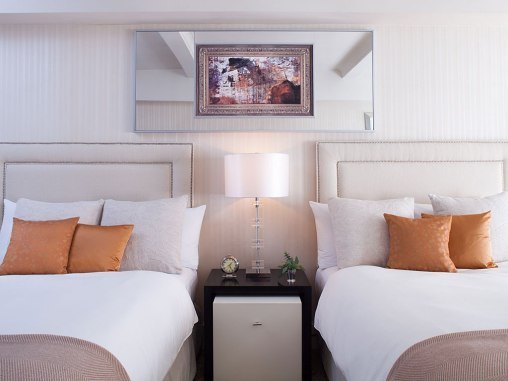By Amy Plitt, Condé Nast Traveler
Traveling can be highly rewarding, but there's no doubt about it--long hours on the road and jetlag can seriously hinder getting a good night's sleep. Travel-induced insomnia is something that The Benjamin Hotel, a luxury hotel in Manhattan, takes seriously. The hotel has a dedicated Sleep Concierge to answer any slumber-related questions or concerns--and even offers a menu of 12 pillows, categorized by whether you're a side, back or stomach sleeper, all designed to help travelers rest better.
Recently, the hotel also sought the expertise of Rebecca Robbins, a sleep researcher, consultant and author of Sleep For Success, to help make visitors' nights even better. We got her advice on how to sleep better while traveling.
How did you get into the business of sleep and sleep research?
I started this work about seven years ago by doing some initial formative studies with my professor at Cornell. We realized there's a critical need for education about the importance of sleep--it's a necessity, not a luxury. There's a critical link between sleep and performance--on the job, in the classroom, or on the sports field.
Can you tell us about the program you've devised for the Benjamin Hotel?
I met with staff and discussed the hotel's current sleep program, and from there provided recommendations to really deliver on providing the best quality sleep for their guests. Now everyone at the Benjamin--down to the housekeepers and doormen and front desk staff--knows more about sleep medicine than most doctors. Our hope is for that not only to translate to the employees valuing sleep more in their only lives, but that translating to the guest by showing a real vested interest.
Sleeping in an unfamiliar environment--like a hotel--is probably one of the biggest things that negatively affects people while traveling. What's the best way to make the experience better?
I'm a huge fan of making your hotel room feel as much like home as possible. I pack a picture of my family in my wallet, cashmere socks, and a travel pillow. My co-author and I worked with a company to design a pillow that has silver thread, and it keeps your head cool at night. Little tricks like that can help you feel comfortable in an unfamiliar environment.
What about earplugs or eye masks--do you think those are helpful when adjusting to unfamiliar environment?
Absolutely. I always have a set of high-quality earplugs--get the foam earplugs that block about 60 decibels or above. They're not that expensive but really do the trick. I always pack an eye mask to block out any unwanted light. And a pre-bed routine is really important, too: Start to power your computer down about 90 minutes before bed, and do something relaxing. Another component is taking a warm shower. If you take a nice, warm shower and cool off your room--65 degrees is the best temperature for good sleep at night--that transition helps with sleep onset.
I always take my phone into bed with me--is that something people should avoid doing?
[Laughs] Yeah, we've gotta stop that. Most cell phones typically emit blue, daylight-spectrum light, so one way to get around that is to dim the brightness way, way down. And the other tip if you have an iPhone or any other smartphone is to turn the wireless off. It takes away the worry of emails coming in that you might have to respond to, and that extra step can help you de-stress.
Read on for Robbins' advice on jet lag, insomnia, and more
More from Condé Nast Traveler:
